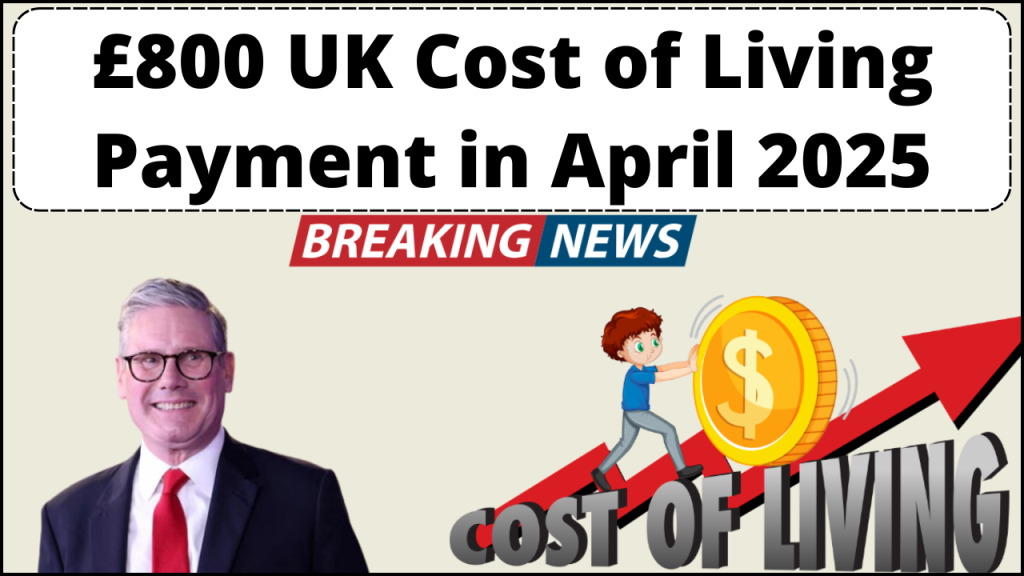
As the cost of living continues to soar across the UK in 2025, the government is stepping up to offer financial support to those most affected. A new support package promises up to £800 in cost-of-living payments, aimed at easing the pressure on low-income families and individuals who rely on means-tested benefits. This support is part of the government’s ongoing effort to help vulnerable households manage rising expenses, from energy bills to everyday necessities.
Here’s a complete breakdown of what the payment includes, who qualifies, when it will be issued, and how to ensure you receive it.
What is the £800 Cost of Living Payment?
The £800 support package is being delivered through three separate instalments spread across the year. These instalments are automatically sent to eligible claimants—there’s no need to apply. The payments are handled either by the Department for Work and Pensions (DWP) or HM Revenue and Customs (HMRC), depending on which benefits the individual receives.
The payment schedule is designed to provide consistent relief throughout 2025, helping people manage financial challenges more effectively during each season.
Payment Schedule for 2025
The £800 support will be distributed as follows:
| Payment | Amount | Expected Date Range | Issued By |
|---|---|---|---|
| First Instalment | £300 | Spring (April to May) | DWP / HMRC |
| Second Instalment | £300 | Summer (July to August) | DWP / HMRC |
| Third Instalment | £200 | Autumn (October) | DWP / HMRC |
These payments will be clearly labelled when they appear in your bank account. If the payment is from DWP, it will be marked “DWP COL” (Cost of Living). If it’s from HMRC, it will appear as “HMRC COLS.”
Carer’s Allowance 2025, Updated Payment Dates, Rates & Eligibility
Universal Credit Goes Up by 6.7% in April 2025, A Full Breakdown of What’s Changing
Who Is Eligible?
To qualify for the £800 payment in 2025, recipients must be claiming at least one of the following means-tested benefits during specific eligibility windows:
- Universal Credit
- Income-based Jobseeker’s Allowance (JSA)
- Income-related Employment and Support Allowance (ESA)
- Income Support
- Pension Credit
- Working Tax Credit
- Child Tax Credit
In addition, individuals receiving disability-related benefits might receive separate additional payments. These include:
- Personal Independence Payment (PIP)
- Disability Living Allowance (DLA)
- Attendance Allowance
- Armed Forces Independence Payment
- War Pension Mobility Supplement
Do note that disability payments follow a different timeline, and the amounts may vary depending on future policy updates.
How Will the Payments Be Delivered?
One of the main advantages of this support package is that no application is required. If you meet the eligibility criteria, the funds will be automatically transferred to your registered bank account.
To avoid any issues:
- Ensure your bank account details are up-to-date with DWP or HMRC.
- Keep track of the eligibility periods and make sure your benefits remain active during those windows.
- Regularly monitor your account for deposits labeled with “DWP COL” or “HMRC COLS.”
What to Do If You Don’t Receive Your Payment?
If you were expecting one of the cost-of-living instalments but it hasn’t appeared:
- Review your bank transactions around the scheduled payment dates.
- Double-check your eligibility—make sure you were receiving one of the qualifying benefits during the relevant period.
- Visit the official GOV.UK portal, where you can report a missing payment.
- Contact DWP or HMRC directly if you need further assistance.
Acting quickly can help resolve any payment delays and ensure you receive your entitled support.
Why PIP Is Important in 2025?
The Personal Independence Payment (PIP) continues to be a vital support for individuals aged 16 and over who live with a long-term illness, disability, or mental health condition. PIP is made up of two parts:
- Daily Living Component – for help with personal tasks like dressing, cooking, or hygiene.
- Mobility Component – for those who have difficulty moving around.
If you’re receiving PIP, you may qualify for extra cost-of-living support, although the government may announce further details separately.
Tips for Managing the £800 Payment Wisely
Getting an extra £800 across the year can provide crucial breathing room, but it’s important to use it effectively. Here are some suggestions for making the most of your payment:
- Prioritize essential costs, such as food, rent, energy bills, and transport.
- Create a budget, use free resources like MoneyHelper or Citizens Advice budgeting tools to plan your spending.
- Avoid high-interest debt. If you’re struggling financially, avoid payday loans and instead seek guidance from organizations like StepChange.
- Plan for seasonal costs, especially heating bills in colder months. Allocating part of your payment can help avoid winter financial strain.
Final Notes
The £800 Cost of Living Payment for 2025 is a significant lifeline for millions of UK residents battling financial hardship. It’s designed to provide consistent, automatic support without the hassle of applying. By staying informed, keeping your benefit status up to date, and budgeting carefully, you can make the most of this much-needed government aid.